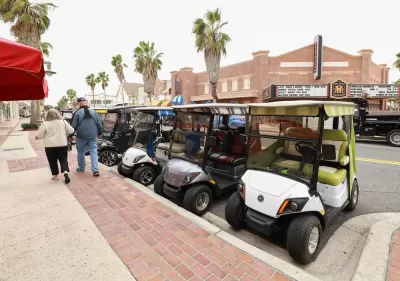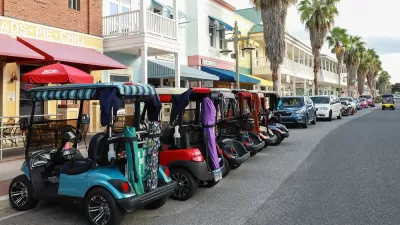Small, lightweight vehicles similar to golf carts could eliminate many Americans’ need for a second car and make roads safer for all users.

Writing in Fast Company, David Zipper highlights the disruptive potential of 'minimobility'—a variation on the more well-known micromobility—in particular, an emerging class of tiny vehicles modeled on golf carts. “While bikes and scooters have been around for well over a century, the addition of small electric batteries has been a revelation, letting riders comfortably handle steep hills and muggy weather (e-cargo bikes are especially helpful when lugging groceries or children).” Meanwhile, smaller, lighter vehicles pose less danger to pedestrians in collisions and produce fewer emissions for building and charging than larger electric cars.
As American cars get bigger and more expensive, small, efficient vehicles could become increasingly attractive to buyers. “Consumer preferences are already showing signs of shifting. In the U.S., more e-bikes are now sold than electric cars,” Zipper points out. “Golf carts—already ubiquitous in suburban enclaves like The Villages, Florida, and Peachtree City, Georgia—are popping up in places like Scottsdale, Arizona, and downtown Tampa.”
Zipper notes that the biggest obstacle to more widespread adoption is America’s tradition of car-centric development and road design, but that the tide is slowly turning in favor of multimodal infrastructure. “The prospect of a rapid shift toward small vehicles should be keeping auto executives awake at night. But from a societal perspective, it could be a dream come true.”
FULL STORY: Why car companies should fear the golf cart

Planetizen Federal Action Tracker
A weekly monitor of how Trump’s orders and actions are impacting planners and planning in America.

Map: Where Senate Republicans Want to Sell Your Public Lands
For public land advocates, the Senate Republicans’ proposal to sell millions of acres of public land in the West is “the biggest fight of their careers.”

Restaurant Patios Were a Pandemic Win — Why Were They so Hard to Keep?
Social distancing requirements and changes in travel patterns prompted cities to pilot new uses for street and sidewalk space. Then it got complicated.

Platform Pilsner: Vancouver Transit Agency Releases... a Beer?
TransLink will receive a portion of every sale of the four-pack.

Toronto Weighs Cheaper Transit, Parking Hikes for Major Events
Special event rates would take effect during large festivals, sports games and concerts to ‘discourage driving, manage congestion and free up space for transit.”

Berlin to Consider Car-Free Zone Larger Than Manhattan
The area bound by the 22-mile Ringbahn would still allow 12 uses of a private automobile per year per person, and several other exemptions.
Urban Design for Planners 1: Software Tools
This six-course series explores essential urban design concepts using open source software and equips planners with the tools they need to participate fully in the urban design process.
Planning for Universal Design
Learn the tools for implementing Universal Design in planning regulations.
Heyer Gruel & Associates PA
JM Goldson LLC
Custer County Colorado
City of Camden Redevelopment Agency
City of Astoria
Transportation Research & Education Center (TREC) at Portland State University
Camden Redevelopment Agency
City of Claremont
Municipality of Princeton (NJ)





























